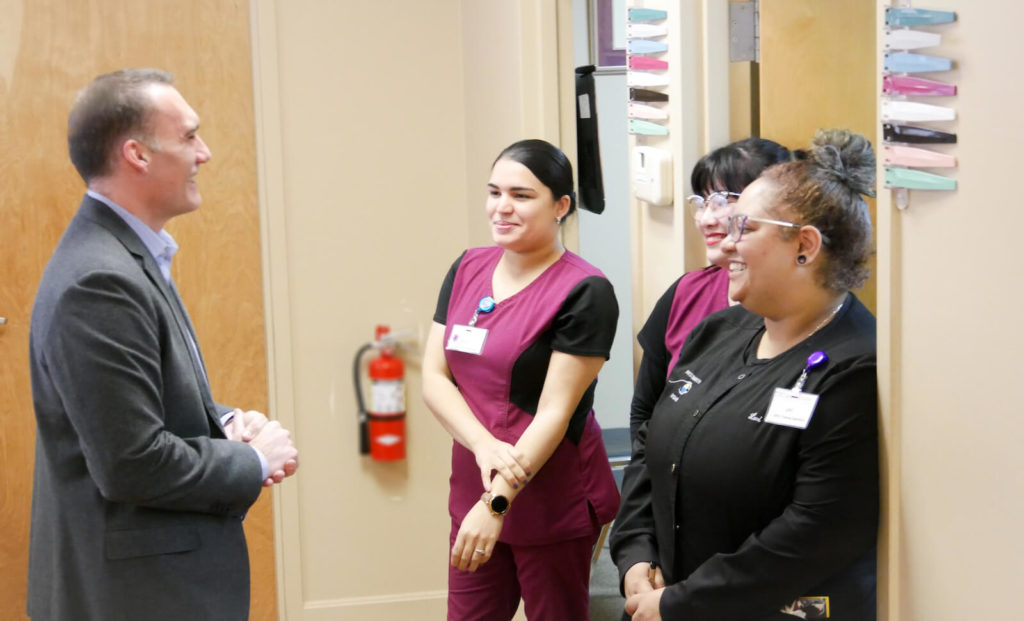Your staff are hugely important to the success of your clinic, and investing time and energy into training is a great way to enhance the quality of care your patients may receive.
In this article, we will discuss the importance of being communicative, using interactive techniques, and listening to your employees, among other things, to effectively engage optometry staff during training.
Contact Dr, Scott Colonna and his team to receive personalized coaching calls and support in empowering your staff and reaching your business goals.
Set the Tone
If you want to be an effective leader, one of the first steps you can take is to set the tone of your office and cultivate a positive atmosphere. Growth-minded individuals are more likely to be proactive in solving problems and taking on new challenges.
Encourage your staff to become learners forever and constantly update their knowledge base with new skills and interests. Some neat ways to create a positive learning environment include the following:
- Use incentives and take advantage of a bit of competition
- Let people learn at their own pace and encourage them to ask questions when necessary
- Provide access to tools and resources that can help facilitate learning
- Use positive reinforcement and kindness when teaching
Treat your staff respectfully and motivate them to constantly seek opportunities to learn and grow within their career and your business.
Focus on Educational & Relevant Topics
Focus on teaching educational content relevant to the cases you often see in your practice. Using actual patient cases to assist with their training can be advantageous.
For example, If you had a patient come in last week with a complex prescription, use this as an opportunity to learn and teach your staff how they might handle the situation.
Be Organized
Organized training curriculums can positively impact the quality of your staff’s learning, and it may be better to prepare ahead. Encouraging your team to be organized starts with leading by example. Here are a few tips to help you stay organized:
- Set specific goals
- Track progress
- Use a scheduler or agenda
- Limit distractions and create a clean work environment
- Use labels or folders to organize documents and files

Keep Things Interactive & Fun
People learn differently, and it is important to accommodate this within your training curriculum. Here are a few activities you might consider implementing at your practice:
Role Playing
Studies have shown that role-playing is an effective exercise for getting individuals to think critically about complex situations and develop creative solutions. For example, you can have one staff member play the patient and the other as the doctor who walks them through a procedure or treatment plan.
Video Tutorials
Videos have become a progressively important aspect of higher education and for a good reason. It can help facilitate learning and become a resource to look back on when further study is needed. If your practice likes to follow any unique protocols, consider creating training videos that the staff can easily access.
Workshops
Workshops are a great way to teach about new machinery or equipment that the staff may be asked to use daily. It may be worthwhile to set aside some time to teach them how it works and when they might be expected to use it.
Discussion Groups
A good way of promoting learning is by encouraging your staff to actively engage in conversation and discuss more complicated procedures or tasks with each other. You could prepare questions in advance or use previous patient cases to facilitate the conversation and learning.
Be Communicative & Attentive
Asking questions is a normal and important part of learning, and providing your staff with an easy way to get answers might be beneficial for training purposes. An open line of communication by email, phone, or text are all good solutions for staying involved and attentive to their training needs.
Listen to Your Employees & Collect Feedback
Employee feedback is a great method to evaluate your training and determine what’s working versus what’s not. Listening to your employees is also an excellent way of making them feel heard and valued at your practice. Here are some simple ways to collect and receive employee feedback:
- Use anonymous surveys
- Host events or dinners to discuss progress
- Conduct entrance and exit interviews
- Have one-on-one meetings
If your employee chooses to share their opinions and comments, make an effort to respond positively and make them feel comfortable with having their voice heard.
Feedback From Patients
Employee feedback isn’t the only beneficial information to be collected. Ask your patients to fill out surveys or answer questions about the services they are being provided. Patient feedback can be an excellent resource for creating future lesson plans and training materials.
Book a Consultation
Dr. Scott Colonna and his team are professionals with lots of experience in helping optometry clinics and practices to grow and reach new levels of success. Book an appointment today to learn more about how we can help you grow your optometry practice.



